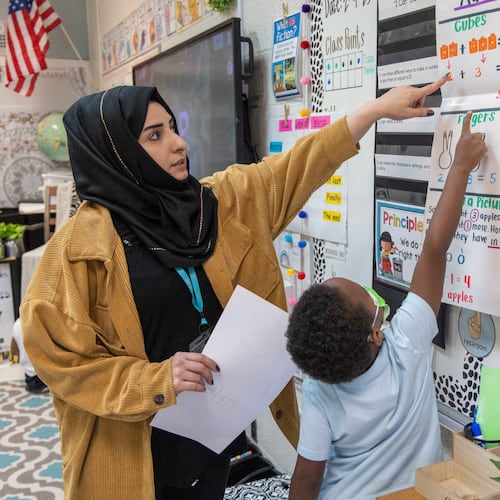After Georgia’s restrictive abortion law took effect in 2022, abortion providers at Feminist Women’s Health Center turned away as many as 10 or 11 people a day because they were too far along on their pregnancies.
On Tuesday, a day after a Fulton County judge overturned that law, the Atlanta-based clinic turned away none of the 44 people scheduled to get an abortion for reasons related to the Georgia law.
While that was a busy calendar for a Tuesday, clinic Executive Director Kwajelyn Jackson expects cases to pick up by Friday.
The health center is one of several abortion rights advocates and providers who sued the state over the law. Fulton Superior Court Judge Robert McBurney sided with the plaintiffs, overturning the law, which outlawed the procedure in most cases once a doctor could detect fetal cardiac activity, typically about six weeks into a pregnancy and before many know they are pregnant.
McBurney’s order allows abortions up to about 22 weeks of pregnancy and declared the more restrictive law violated the state constitution.
A spokeswoman with the attorney general’s office said the state plans to appeal, but for now Georgia has the least restrictive abortion law in the South.
In his order, McBurney said the law took away a woman’s liberty to make choices about her own body.
“It is not for a legislator, a judge, or a commander from The Handmaid’s Tale to tell these women what to do with their bodies during this period when the fetus cannot survive outside the womb any more so than society could — or should — force them to serve as a human tissue bank or to give up a kidney for the benefit of another,” he wrote.
State Sen. Ed Setzler, an Acworth Republican who sponsored what became Georgia’s abortion law, said he was certain the state Supreme Court would overturn McBurney’s ruling.
“I can’t speak to motives, but looking at the circumstances and Judge McBurney’s actions, it was naked judicial activism,” Setzler said.
Lucia Diaz-French, who volunteers as a clinic escort at Feminist Women’s Health Center, said she terminated a pregnancy when she was 21 and living in New York.
“I had a lot of privilege in my experience,” said Diaz-French, who is 36 and lives in Atlanta.
Diaz-French said she had ample options when deciding where to go for the abortion and didn’t have to deal with screaming protesters.
“I can’t imagine people yelling and trying to force their ‘compassion’ on me,” she said. “Because that’s what they call it — compassion. I’m not here to change anybody’s mind. I just want to make sure that everyone is safe, even if it is just walking from the car.”
Not all the people who visit the clinic support abortion rights. It often happens that people who drive women to the clinic are anti-abortion but love their friends, staff said.
Alisena said she drove about five hours from Alabama on Tuesday morning to bring her 24-year-old best friend to get an abortion at Feminist Women’s Health Center. Her friend, afraid of being tracked and prosecuted, left her cellphone in Alabama. Alisena declined to share her last name, saying she also was fearful of being arrested.
Alisena said she supports Georgia’s 2019 law, as long as there are exemptions.
“Some women need to get abortions for medical reasons,” she said. “That’s what’s happening with (her friend). If she doesn’t do it, she might die. ... Even though I am against it, I have support for women who do need to get an abortion.”
Jason Cantrell was one of small group of people who gathered to protest, not in response to Monday’s ruling, but because they protest most days the clinic offers abortions.
Cantrell, a Houston County resident who travels two hours to the clinic three times a week to discourage women from getting abortions, pointed out Feminist Women’s Health Center sits across the street from the Children’s Hospital of Atlanta and next to a school.
“I find it funny that over there they save children, over there they teach children and in here they kill children,” Cantrell said.
About the Author
Keep Reading
The Latest
Featured




